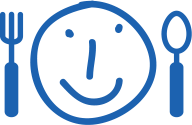Project Information
Target groups and partners
The main target groups for the project will include early years settings staff, as well as in-house and external kindergarten caterers. Other important target groups will include early years managers, public administration decision makers and those further and higher education establishments that offer training to individuals wishing to develop their careers in the early years sector.
The e-learning course and portal “Sustainable food in kindergartens” will offer the opportunity to develop a new and innovative set of skills and competencies relevance to the above mentioned target groups. A minimum of 250 persons should be reached in each country by the project’s activities.
For dissemination purpose a European network of stakeholders will be created. The network will be called the “community of practice for sustainability in kindergartens” and will provide feedback on the content and applicability of the e-learning course.
The partnerships consists of eight partners from seven countries – Austria, Bulgaria, Czech Republic, Germany, Italy, Slovenia and the United Kingdom. The partners are institutions with experiences and competencies in different areas of sustainability and education.
The course will be evaluated during a testing phase with at least fifteen participants in each country. They will test the e-learning course, modules and content as well as the online portal and feedback their findings through interviews and questionnaires.
New requirements for individuals working in early years settings
The vocational skills required by educators and staff employed in early years settings in Germany and other countries in Europe has changed dramatically in the past 10-15 years. In nearly all European countries, the number of hours a child spends in an early years setting is increasing. In Germany, all day care of children is up to 48.9 %. Because of this increase, staff in early years settings have become responsible for a wide range of new tasks and operational processes. One such important responsibility is for that of food within the settings.
In many European countries, formal training courses / qualifications for staff do not require individuals to have an awareness of nutritional standards within their settings. This project aims to develop the professional profile of staff in early years settings by providing information on sustainable food and meal production. By developing their knowledge base around food and nutrition, early years staff can then communicate positive messages to parents, as well as assisting refugee families with their integration into their new host countries.
New challenges from refugee children
With the influx of large numbers of displaced refugee families onto mainland Europe, new challenges have been presented to early years staff. Traditionally, the kindergarten and similar settings are the places where families with young children meet. These community hubs now provide an ideal opportunity for refugee families to meet with local families and for them to learn about each others cultures and societies. In order to help integrate these new refugee families, it is important that early years staff have an awareness of eating habits, religious backgrounds and rituals. This project a puts a special focus on these need
The e-learning course will comprise 5 modules and 15 learning units covering the following topics:
- Module 1: The key role of kindergarten staff to change food habits
- Module 2: How to raise quality and make food more sustainable
- Module 3: Outdoor learning as a good opportunity
- Module 4: Food taste and intercultural eating skills
- Module 5: How to communicate with and inspire parents



